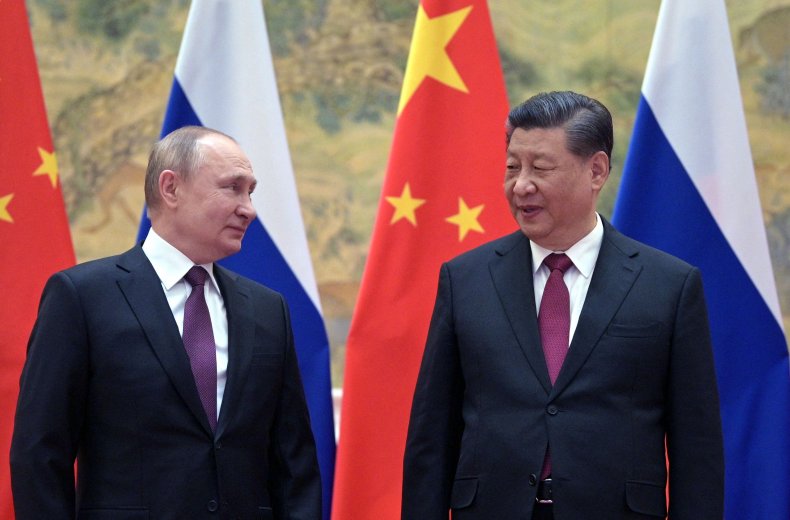China should be studying the lessons of Soviet and Russian leaders past and present to avoid repeating Vladimir Putin’s gross miscalculation in Ukraine, Michael McFaul, the former U.S. ambassador to Russia, said this week.
The Chinese leadership, whose designs on Taiwan resemble Putin’s on Ukraine, has been backing Russia rhetorically— and potentially materially—throughout the first eight weeks of the war. McFaul believes Xi Jinping and his senior officials run the risk of believing their own propaganda about American declinism.
In an interview with Taiwan’s TVBS on Monday, the former U.S. envoy to Moscow told Wenchi Yu, a non-resident fellow at Harvard’s Ash Center, that lessons could be gleaned from the Soviet Union’s unsuccessful intervention in Afghanistan in the late 1970s, during another period in which the United States was said to be in retreat.
“I hope that Chinese Communist Party leaders in Beijing are studying those lessons, learning those lessons and avoiding overreach,” said McFaul, now a professor at Stanford. “Because sometimes when I hear them speak, and when I hear their surrogates speak, it sounds a lot like Soviet leaders in the 70s, where they’re talking about: ‘We are rising. America is in decline.'”
‘No Allies’
He continued: “I would just say, hold on to your horses here. I’ve seen this story before. China has a long ways to go before they catch up to the United States in terms of GDP per capita. China has no allies in the world to speak of. The vast majority of people in the world support democratic ideas over autocratic ideas.”
“I think it’s way too premature to start to believe the things you put on your propaganda, which is that the United States is in decline,” said McFaul, who served as ambassador between 2012 and 2014 during the Obama administration.
Russia’s struggles in Ukraine are another important lesson for Beijing, according to McFaul. “Look at what’s going on. The alleged No. 3 military in the world…is being defeated right now by the Ukrainian military.”
“I hope Chinese leaders are looking at that when they think about using military force against Taiwan. Taiwan after all is way better armed than Ukraine was,” he said. “The military relationship between the United States and Taiwan is much more robust than it is between Ukraine and the United States.”
The force of Western sanctions against Russia and the globally integrated nature of China’s economy will also give Beijing pause, McFaul said, noting that Chinese leaders should be “doing the calculations.”
The former ambassador, who has spent two decades writing about the Russian president, said he underestimated Putin’s willingness to use force, as well as his “evilness.”
“In my view, Mr. Putin grossly miscalculated. He thought it was going to be an easy war, he thought the West would not unite, and he didn’t expect the sanctions. I hope the Chinese leaders are studying those very important lessons as they unfold,” he said.
Before he ordered the invasion of Ukraine, Putin spent months convincing the world that Ukraine’s ambition to join NATO was a threat to Russia’s national security. But in an hour-long address on the eve of the military campaign, he spent little time discussing the North Atlantic Alliance. Instead, he questioned Ukraine’s identity and described its very existence as a historical error.
Russian Economic Weakness
“What threatens Mr. Putin is not NATO expansion; it’s democratic expansion,” McFaul said. In two months of war, Russia’s leader achieved neither “denazification” nor “demilitarization,” but in the process has united the West, weakened the Russian economy and exposed the vulnerabilities of his country’s armed forces.
“I think it’s very irrational to have invaded Ukraine. I think It’ll go down in history as a great overreach, overextension, that will be very detrimental to Russia itself,” McFaul concluded.
The former official doesn’t see a scenario in which Russia prevails, given its resource and manpower deficiencies. The most likely outcome, he says, is a stalemate that leads to a negotiated end to the war. To achieve that, however, Ukraine will require more weapons.
Follow Newsweek‘s live blog for the latest on the Russia-Ukraine war.

ALEXEI DRUZHININ/Sputnik/AFP via Getty Images
Stay connected with us on social media platform for instant update click here to join our Twitter, & Facebook
We are now on Telegram. Click here to join our channel (@TechiUpdate) and stay updated with the latest Technology headlines.
For all the latest For Top Stories News Click Here
